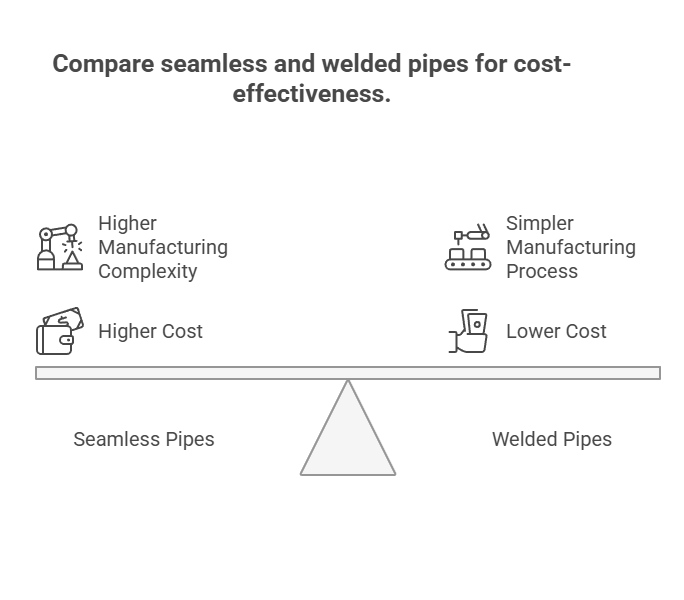Nickel‑copper pipes (commonly Cu‑Ni or Monel alloys) are extensively used in marine, chemical, and power applications due to their excellent corrosion resistance and durability. Pricing varies significantly based on alloy ratio (e.g., 90/10, 70/30 Cu‑Ni, or Monel 400), pipe type (seamless vs. welded), region, and specifications. This guide offers detailed pricing data, cost factors, and buyer strategies.

Current Price Overview by Alloy and Type (Mid‑2025)
| Alloy / Grade | Type | Price Range (USD/kg) | Notes |
|---|---|---|---|
| Cu‑Ni 90/10 (C70600) | Seamless | 15–30 USD/kg | Typical maritime use |
| Cu‑Ni 90/10 | Welded | 10–25 USD/kg | Standard piping grade |
| Cu‑Ni 70/30 (C71500) | Seamless | 12–18 USD/kg | Higher nickel content, robust |
| Cu‑Ni 70/30 | General pipe | 25–30 USD/kg | Indian FOB-market |
| Monel 400 (Ni‑Cu Alloy 400) | Pipe | 40–120 USD/kg | Corrosion-resistant, premium price |
| Standard Cu‑Ni | P.O. Made‑in‑China | 3.5–10 USD/kg | Bulk orders from Chinese suppliers |
Price Variation by Region & Source
| Region / Supplier | Price Range (USD/kg) | Alloy |
|---|---|---|
| China (wholesale) | 3.5–13 USD/kg | Cu‑Ni 90/10, 70/30 |
| India (FOB) | 20–30 USD/kg | Cu‑Ni 90/10 & 70/30 |
| Global maritime suppliers | 15–30 USD/kg | 90/10 and 70/30 Cu‑Ni |
| Premium Monel 400 | 40–120 USD/kg | Higher-performance pipes |
How Prices Are Calculated
Cu‑Ni pipe pricing is often based on metal content and market price:
Formula: 90% × daily copper LME price + 10% × daily nickel LME price + processing margin
Processing margin includes machining, alloy certification, testing, and logistics.
Factors Driving Pipe Prices
| Factor | Impact on Price |
|---|---|
| Alloy Composition | Higher nickel (70/30, Monel) = higher cost |
| Pipe Type | Seamless > Welded due to manufacturing complexity |
| Wall Thickness & Size | Thicker / larger diameters increase material costs |
| Certifications & Standards | ASTM B466, B111, DIN, MIL-T add premium |
| Order Volume & MOQ | Higher volumes reduce per-unit cost |
| Region & Freight | Export from China/India cheaper; freight & tariffs add cost |
Tips to Secure Competitive Pricing
1. Define alloy & type: Choose 90/10 for cost-effective corrosion resistance, 70/30 or Monel 400 for greater performance.
2. Compare seamless vs. welded: welded can be up to 20% cheaper.
3. Purchase in bulk: Aim for 500 kg+ to leverage best pricing & shipping.
4. Negotiate origin: Chinese suppliers offer lower ex-works prices (US$3–13/kg), but include duties & transport.
5. Confirm certifications: Required marine standards (ASTM B466/B111, MIL-T, DIN) bring added assurance—and cost.
Frequently Asked Questions
What is the current price of 90/10 copper‑nickel pipe?
The global price for Cu‑Ni 90/10 seamless pipe ranges from approximately USD 15–30/kg, while welded variants can be USD 10–25/kg, depending on order size and certification .
Why is Monel 400 pipe more expensive than Cu‑Ni pipe?
Monel 400 contains around 67% nickel and 30% copper—it offers superior corrosion resistance (especially in marine and chemical environments) and strength, leading to costs of USD 40–120/kg, far above standard Cu‑Ni pipes .
How are Cu‑Ni pipe prices calculated?
Prices are typically calculated as: 90% of current copper LME price + 10% of nickel LME price, plus processing costs. Additional premiums apply for alloy grade, certifications, and seamless production.



